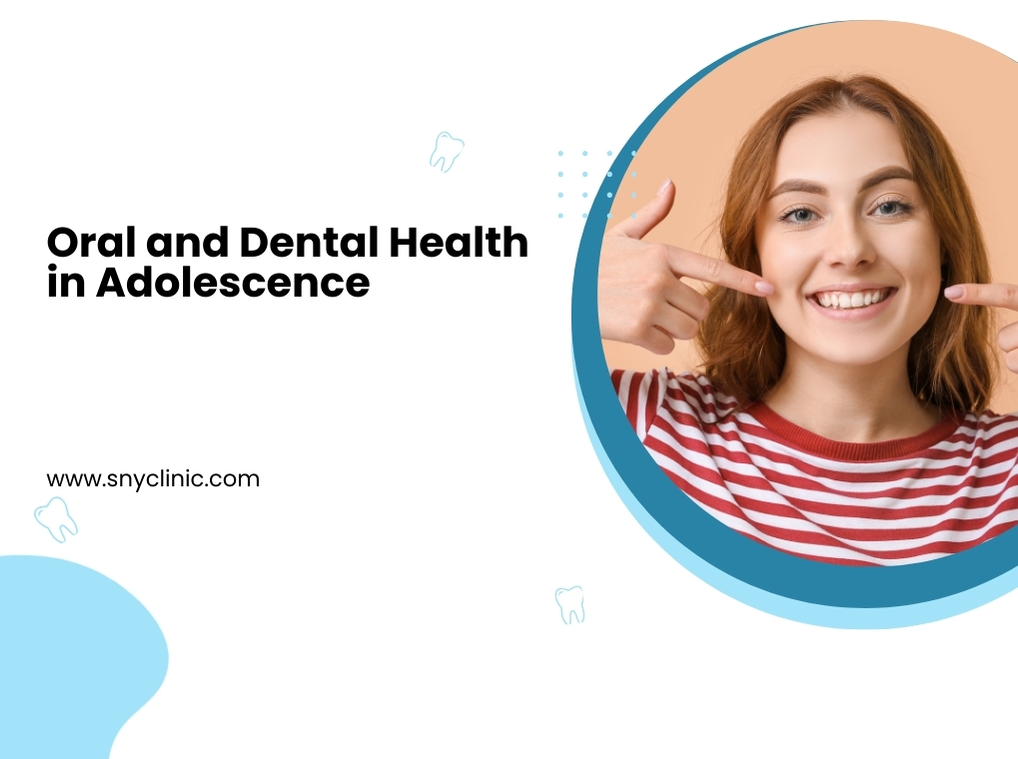Oral and Dental Health in Adolescence

Oral and Dental Health in Adolescence
Oral and Dental Health in Adolescence
Adolescence is a special period in which many physical, hormonal, and psychological changes occur during the transition from childhood to adulthood. These changes affect not only physical appearance but also directly impact oral and dental health. Rapid growth, increased energy needs, changes in eating habits, and possible neglect of hygiene can put oral and dental health at risk during adolescence.
In this article, we will discuss why oral and dental health is important during adolescence, the most common problems encountered, ways of prevention, and the importance of regular dental check-ups.
Factors Affecting Oral and Dental Health in Adolescence
1. Hormonal Changes
The increase in hormone levels such as estrogen and testosterone during adolescence can increase gum sensitivity and bleeding tendency. Therefore, the risk of developing gum disease is higher during adolescence.
2. Eating Habits
Due to rapid growth, adolescents need more energy. However, this energy is often obtained from fast food, junk food, and carbonated drinks. Frequent consumption of foods high in sugar and acid accelerates tooth decay and enamel erosion.
3. Orthodontic Needs
Crowded teeth, jaw development disorders, or alignment problems in teeth become more apparent during adolescence. Therefore, orthodontic treatment (braces) is most often applied at these ages.
4. Psychological and Social Factors
Adolescents pay more attention to their appearance during this period. A healthy and aesthetic smile increases their self-confidence. Bad breath, tooth discoloration, or crooked teeth can lead to loss of confidence in social relationships.
The Most Common Oral and Dental Health Problems in Adolescence
1. Tooth Decay
Excessive consumption of sugary foods and drinks, irregular tooth brushing habits, and lack of hygiene increase the rate of cavities during adolescence.
2. Gum Problems
Due to the effect of hormones, gums can easily swell, bleed, and become sensitive. If neglected, this can lead to serious gum diseases such as gingivitis and periodontitis.
3. Orthodontic Problems
Crowded teeth, narrow jaws, or gaps between teeth become noticeable during this period. Adolescence is usually the most suitable age range for orthodontic treatment.
4. Teeth Grinding (Bruxism)
Intense study schedules, exam pressure, and social anxiety can trigger teeth grinding (bruxism) habits in adolescents. This habit can eventually cause tooth wear, jaw joint discomfort, and headaches.
5. Bad Breath
Irregular oral hygiene, bacterial buildup on the tongue surface, and poor eating habits can cause bad breath in adolescence.
Recommendations for Protecting Oral and Dental Health
1. Regular Tooth Brushing
Teeth should be brushed at least twice a day, preferably after breakfast in the morning and before bedtime at night. Using fluoride toothpaste reduces the risk of cavities. Brushing the tongue also helps prevent bad breath.
2. Dental Floss and Mouthwash
Toothbrushes alone are not enough. Using dental floss removes food residues between teeth. Antibacterial mouthwashes also support gum health.
3. Balanced Nutrition
Instead of junk food, calcium-rich foods such as milk, yogurt, and cheese should be consumed. Carbonated drinks should be avoided, and plenty of water should be consumed. Fresh vegetables and fruits are beneficial for both overall health and oral health.
4. Orthodontic Check-ups
When crowded or misaligned teeth are noticed, an orthodontist should be consulted. Early intervention shortens the treatment period and yields more successful results.
5. Stress Management
To prevent teeth grinding, regular sports, hobbies, and relaxation techniques can be applied.
6. Dental Check-ups
It is recommended to visit the dentist at least twice a year during adolescence. Thus, cavities and gum problems can be detected early.
Recommendations for Families and Adolescents
Families should not leave oral care entirely to their children during adolescence; they should remind them when necessary. Young people should remember that dental health is not only about a beautiful smile but also directly affects overall body health. Adolescents undergoing orthodontic treatment should pay extra attention to oral hygiene, as braces make cleaning more difficult.
How are gum problems treated during adolescence?
Adolescence is one of the most important periods in which lifelong oral and dental health habits are formed. During this process, regular tooth brushing, balanced nutrition, and routine dental check-ups help young people maintain healthy teeth and support their self-confidence. With the guidance of families and expert support, proper care during adolescence can largely prevent problems that may occur in later years.
Recent Blog
1.
Oral and Dental Health in Adolescence
2.
Effects of Stress on Dental Health
3.
Can an Infected Tooth Be Extracted? Extraction of an Abscessed Tooth and Treatment Methods
4.
Why Do Tooth Stains Occur and How Can They Be Removed?
5.
The 5 Most Common Dental Problems in Children
Categories
Smile Design 0
Implant Treatment 2
Teeth Whitening 1
Prosthodontics 0
Aesthetic Dentistry 0
Zirconium 0
Porcelain (Leaf) Laminates 0
Full Porcelain Crowns 0
Prosthetic Dentistry 0
Removable Prostheses 0
Implant Prostheses 0
Transparent Plate (Invisalign) Treatment 0
Dental Fillings 0
Endodontics and Root Canal Treatment 0
Periodontology 0
Gum Treatments 1
Oral and Maxillofacial Surgery 0
Dental Diagnosis and Radiology 0
Pedodontics (Child Dentistry) 0
Digital Dentistry 0
20 Year Old Teeth 0
Tooth Extraction 0
Dental Trauma and Treatments 0
Conscious Sedation 0
Apikale Resektion 0
Tooth Abscess 0
Cyst Operations 0
Preprosthetic Surgery 0
Frenectomy 0




